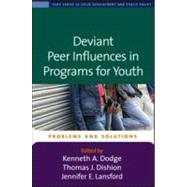Most interventions for at-risk youth are group based. Yet, research indicates that young people often learn to become deviant by interacting with deviant peers. In this important volume, leading intervention and prevention experts from psychology, education, criminology, and related fields analyze how, and to what extent, programs that aggregate deviant youth actually promote problem behavior. A wealth of evidence is reviewed on deviant peer influences in such settings as therapy groups, alternative schools, boot camps, group homes, and juvenile justice facilities. Specific suggestions are offered for improving existing services, and promising alternative approaches are explored.








